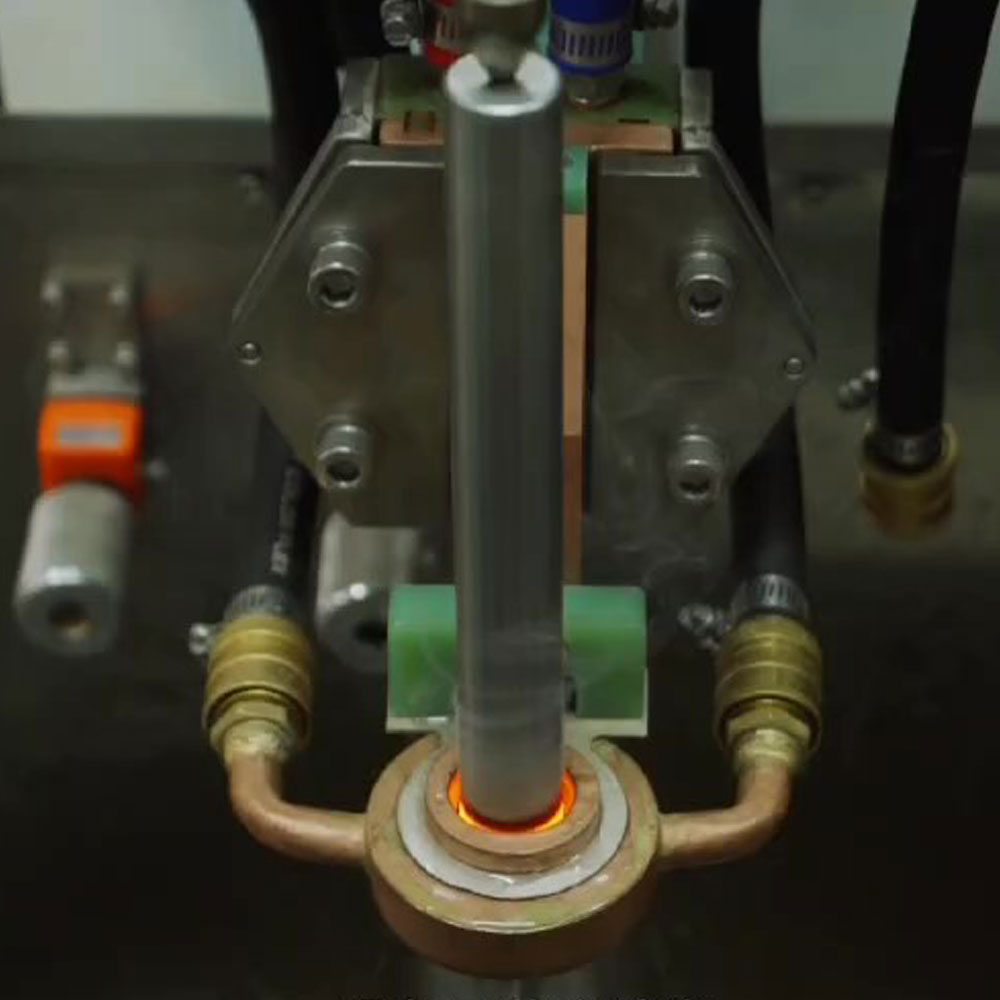What is an induction heat hardening machine?
Induction heat quenching is an efficient and rapid method, serving as a more effective alternative to traditional heating methods such as resistance or open flame. It is a process used for surface hardening of steel and other alloy components. Parts requiring heat treatment are placed within a copper coil, and by applying alternating current to the coil, the part is heated above its transformation temperature. This method offers numerous advantages and is increasingly popular in industrial, medical, and household applications.

Benefits of Induction Heat Quenching
- Localized Hardening: Induction heat quenching allows for precise hardening of specific areas of a workpiece, achieving accurate penetration depths.
- Increased Strength: This method ensures uniform hardening throughout the material structure, customizing the hardness level of steel components as required.
- Tempering: After induction heat quenching, parts can be tempered to customize hardness levels. More tempering cycles result in lower hardness and reduced brittleness.
- Minimal Labor: Induction heat quenching requires minimal manual intervention and can be fully automated according to needs.
- Minimal Distortion: Faster heating and cooling of metal components ensure uniform heating with minimal deformation.
- Enhanced Wear Resistance: The increased hardness from induction heat quenching improves the wear resistance of processed parts.
- Cost Reduction: Automated equipment can reduce labor costs, lowering overall expenses.
- Safety: Induction heat quenching eliminates the need for open flames.

Induction heat quenching is a practical method for hardening steels with specific carbon content levels. It offers advantages such as uniform hardening, low energy consumption, and fast delivery times.
Applications of Induction Heat Quenched Steel Blades
1. Metalworking Industry:
- Turning Tools: Such as turning tools and boring tools. Induction heat quenching increases the edge hardness of these tools, extending their lifespan.
- Milling Tools: Including face mills and end mills. Through induction heat quenching, these tools achieve higher surface hardness while maintaining good toughness.
- Drilling Tools: Such as twist drills and deep-hole drills. Induction heat quenching enhances the hardness of the working part at the drill tip, ensuring stability and precision during prolonged use.
2. Agricultural Machinery and Gardening Tools:
- Harvester Blades: Used for crops like grains and hay. Induction heat quenching improves the wear resistance and corrosion resistance of the blades.
- Lawn Mower Blades: Whether handheld or riding mowers, these blades require excellent cutting efficiency and long-lasting durability. Induction heat quenching technology effectively meets this demand and redces maintenance costs.
3. Woodworking Industry:
- Circular Saws and Planer Knives: Used for cutting, planing, and shaping wood. Induction heat-quenched blades are sharper and more wear-resistant, suitable for efficient processing of various hardwoods and engineered boards.
Induction heat quenched steel blades have gained widespread industrial application due to their unique heat treatment process. These blades offer superior hardness, wear resistance, and stability, providing efficient solutions across various industries.
Customer Case Study: Automotive Components Manufacturer
A well-known automotive components manufacturer focused on producing high-performance engine crankshafts, connecting rods, and other critical parts. With growing market demands and advancing technology requirements, the client needed to enhance the manufacturing quality of these key components, particularly in heat treatment processes.
Client Requirements
- Consistent Product Quality: Ensure each batch of products achieves consistent hardness and wear resistance standards.
- Versatile Processing Capabilities: Flexibly handle the heat treatment needs of different engine crankshaft and connecting rod models.
Solution
-Custom Induction Coil Design: Based on the three-dimensional models of crankshafts and connecting rods provided by the client, we designed multiple highly-matched induction coils to achieve optimal magnetic field distribution and heating paths.
- Integrated Cooling System: Equipped with an efficient water-cooling system to ensure safe operation of the induction coils and provide adequate cooling for auxiliary equipment.
- Safety Measures: Installed emergency stop buttons, shielding enclosures, temperature sensors, and other safety devices to comprehensively protect operator safety.
Implementation Process
From site surveys, solution design, to equipment installation and commissioning, every step was carried out strictly according to the planned schedule. We promptly responded to special requirements proposed by the client, such as adjusting the heating method for complex-shaped parts, and provided reasonable solutions. Additionally, we offered comprehensive training sessions to help the client’s technical personnel master the new equipment's operational skills and daily maintenance essentials.
Summary
By introducing induction heat quenching machines, the renowned automotive components manufacturer successfully upgraded its critical component heat treatment processes. This not only enhanced product competitiveness but also laid a solid foundation for the company's sustainable development.


